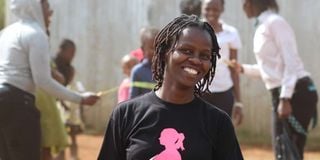Urgently address teenage pregnancies in Meru

As a victim of teenage pregnancy and survivor of early marriage and gender-based violence, the alarming statistics of teenage pregnancies in Meru County, as reported by the Kenya Health Information Systems last year and this month, highlight a critical issue that demands immediate attention and concerted action.
With over 15,000 girls impregnated in Meru, it is clear that teenage pregnancy is a crisis of national significance. It also begs the question: if Meru had the highest proportion of adolescent pregnancies between the ages of 10-19 last year, and this number has increased this year to 15,000, what has the county and national government been doing?
This issue calls for the urgent intervention of county authorities, the ministries of Gender, Health, Child Protection Services, and the Judiciary.
Teenage pregnancy in Meru is not just a statistic; it represents thousands of young lives that have been disrupted, and whose futures have been compromised and dreams shattered. It is also a matter of great concern that signals a persistent cycle of child abuse that is going unaddressed!
These pregnancies often led to school dropouts, perpetuating the cycle of poverty, increasing cases of gender-based violence, and psychological trauma, and limiting opportunities for these young girls.
Moreover, teenage mothers face significant health risks, including complications during childbirth, which can be fatal for both mother and child. This situation underscores the need for a multi-faceted approach to tackle the root causes and offer support for the girls.
Meru authorities must take the lead in addressing this crisis. Local leadership can initiate community-based programmes that focus on education and awareness creation. Comprehensive sex education should be integrated into primary and secondary school curricula to empower young people with knowledge of reproductive health and contraception. An emphasis should be put on creating safe spaces for teenagers to discuss these issues openly to help dispel myths and reduce stigma
The Ministry of Gender plays a crucial role in advocating the rights and well-being of young girls, hence should spearhead campaigns that promote gender equality and challenge harmful cultural practices. By working closely with community leaders, the ministry can foster an environment where girls are valued and protected.
Veronica Mwende, Nguvu Change leader




